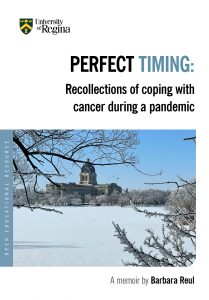7 It’s all About Impact – and Open Access: From Memoir to Textbook
Barbara Reul
This recording explains how my book Perfect Timing – which was published as an open access memoir-textbook on 23 December 2021 – came to be (“The Why – The How – The Good – The Challenging – The Academic”).
During the Winter (Jan.-April) 2022 semester, it was used as an assigned reading in the ENGL 110 Critical Reading and Writing class “Medicine and Mortality: Illness Narratives,” taught by my colleague, Prof. Scott J. Wilson, at Luther College at the University of Regina.

In the Question and Answer part following my presentation, Prof. Wilson talks about his experiences as an instructor using this open access resource. The latter includes an Appendix with “Reading Leading Questions” to get the discussion amongst readers.
An article on this presentation appeared in the OER Spring 2022 newsletter. The text is reprinted below for your convenience.
***
Perfect Timing – From Memoir to Textbook
By Barbara Reul
My OER “story” is unusual in that I used the UR Pressbooks online platform to publish a semi-autobiographical account in December 2021. It was used by my colleague, Prof. Scott J. Wilson, as an assigned reading in his English 110 Critical Reading and Writing class on “Medicine and Mortality: Illness Narratives” at Luther College, University of Regina, in the Winter 2022 semester.
Perfect Timing is an educational, entertaining, and highly personal memoir that I wrote during the global pandemic. As a middle-aged, immigrant, and non-partnered academic living in a sunny Canadian prairie province, I provide an insightful snapshot of my occasionally bumpy yet spiritually transformative health journey. It began in late July 2020 with a sudden diagnosis of advanced
cervical cancer.
Prior to February 23, 2021, when my book was “born”, I had never considered writing about myself. My focus as a music history professor at Luther College is on disseminating my research in peer-reviewed secondary sources.
Yet, I was woken up that night (at 2 am!) and given “a special task” by my inner guidance system. “Get up, turn on your computer, and start typing,” it said – and within 45 minutes, I had drafted a Table of Contents, specifically 15 of what would ultimately be 16 chapter titles. (Automatic
or channeled writing as it’s called, is nothing new in my scholarly neck of the woods: I have benefitted from it as an academic for many years, but then my brain as a trained organist also works differently.)
Only two primary sources were required for this type of “autobiographical scholarship”: my memory, and a diary of sorts. I had started it after my surgery in mid-August 2020 and kept it up even though I hate journaling (!). My three main goals as an author were to educate and entertain my readers—no footnotes or bibliography required—and raise funds for cancer research.
My colleague, Scott J. Wilson, had another idea in early March 2021. My initial reaction to conceiving my book as a memoir-textbook was less than enthusiastic (“he’s crazy”). In contrast, “Dr. Barb”, my academic self, immediately recognized its power as an important therapeutic tool.
It took me 14 long and arduous weeks, from February to April 2021, to chronicle my health journey, all the while coping with the aftereffects of six rounds of chemo and 28 radiation therapy treatments. The thought of letting perfect strangers into my head (and heart!) worried me throughout the writing process. I also wished to protect the privacy of other “characters” in my book. Consequently, only names of animals were included – like Winston, the adorable miniature
Schnauzer, whose (academic advisor) mom let him snuggle with Auntie Barb anytime she needed to.
Thankfully, I did not struggle with identifying my target audiences: anyone whose life has been touched by cancer (cancer patients and survivors, caregivers, etc.) and health professionals as well as university students and other members of the academic community. For their benefit, my illness narrative weaves together elements of memoir writing and creative non-fiction. Using humour, I also touch on issues of interest to Women’s and Gender Studies, Spirituality Studies, Religious Studies, and the Fine Arts. Finally, an appendix with “Leading Reading Questions” is intended to lighten the load of fellow professors.
In the late spring of 2021, I began wondering about to which smaller press in Saskatchewan I should offer my manuscript, and how long it would take to be published. That’s when I realized that I cared most about impact – and it sealed the open access “deal” for me.
The final version of Perfect Timing includes a multitude of hyperlinks, many pictures, and even a recording of me playing the pipe organ (which I like to do on Sundays at a local church).
In hindsight, the best part about my first OER “experience” was that as the author-publisher I had complete control over *everything*. That was, however, also the worst part, as I had only myself to blame when things went wrong (and some did…).
I will keep that in mind as I, a proud cancer survivor, work on the sequel, Right on Time, in 2022.

